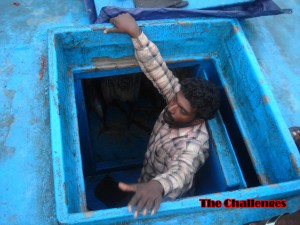As they migrate all over the coast of India, these deep-sea fishing vessels confront many problems. While fishing in the deep seas with their small-mechanized boats, they are often taken into custody by the Coast Guard for questioning. Confused by the intentions of the Coast Guard, the innocent fishermen try to escape and fall into unnecessary legal hassles and problems. Moreover, not knowing the local dialect and culture at the distant landing centres, often leads to many difficulties and problems. Further, even though their preferred fishing technology, long-lining, does not adversely affect local fishing catches, and is an eco-friendly fishing practice, there is often antagonism towards these fishermen by local fishermen, mainly due to the jealousy emerging from better fish catches and also from the local ignorance of long line fishing methods. They are treated unfairly by the locals and the police.
Huge and escalating capital and operational investments are also a major problem, which fishermen never take into account. As the duration of their fishing voyages has increased over the last 20 years, so have the sizes of their boats, leading to excessive capital requirements. Since most of the capital comes from the unorganized sector (through moneylenders), the servicing of this debt becomes excessive. Finally, the inherent risks of operating in the high seas, arising from both natural causes (such as extreme weather) and man-made causes (as was demonstrated by the firing from an Italian ship in Indian waters recently), is very high. It is in this backdrop that these fishermen decided to form an association of their own, with the support of South Indian Federation of Fishermen Societies (SIFFS), a prominent fishermen federation of cooperatives in South India.
Specific Challenges
- Many of the deep sea going fishermen are harassed by the authorities in neighbouring countries on trans-boudnary issues (for example, Sri Lanka, Maldives). This has given considerable mental agony and anguish and strain to their relatives as their whereabouts remain unknown until contact is made through diplomatic/government channels.
- They are away from home for very long periods. They go from place to place in search of fish. The duration per voyage is 20 to 30 days. After every voyage they come to the shore for a while (which may be on any part of the west coast and not their homes) to prepare for undertaking the next voyage. These long trips also make them aliens to their home, children and people.
- There is no regular income for the family. The share from each voyage is generally settled at the time of returning home from their fishing base. This often takes few months. In the meantime they have no practice of sending money by usual financial instruments (money orders or cheques) for the daily requirements of the family. This often lands their families in debts. The wife or the mother is forced to go to the moneylenders, friends and relatives for money with jewellery as mortgage. This puts them perpetually in debt.
- Since the boats are financed by middlemen/moneylenders, their earnings are often drained through debt servicing. This once again forces them to borrow money for their day-to-day expenses and for their return journey to the fishing centers. This vicious circle of debt continues unabated.
- Very often the borrowings are not settled fully. This leads to accumulation of liabilities.
- The fishers have to pay monthly interest to the moneylender. The moneylenders often create problems to the family members for interest and for the repayment of loan if it is not paid on time.
- As the male members are always away from home the women are forced to borrow money to run the family, which puts them into many problems.
- In addition, since the fishermen are in their fishing centres, women have much more additional responsibilities of caring for their extended families, including taking the sick to hospital, dealing with government, and attending functions, festivals, and other important social gatherings.
- The fishermen have to pay higher than the market price for diesel as they are not the natives of the place and find it difficult to get supplies.
- Workers prefer to go for fishing in the boats that have better technology such as GPS, fish finder, etc. Those boat owners who do not have these find it difficult to get required crew members.





